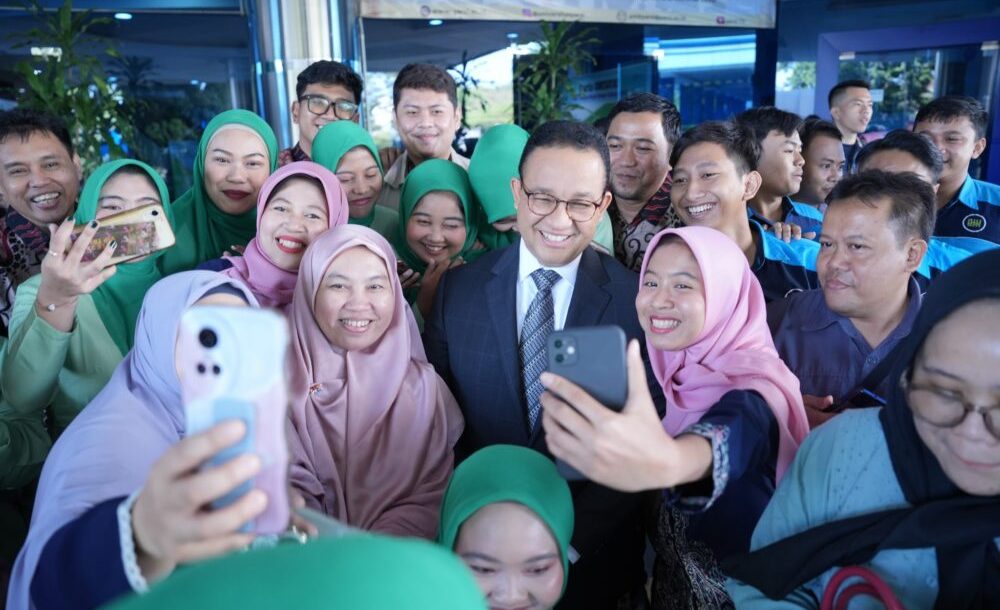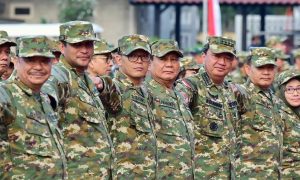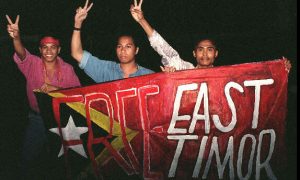Indonesia’s regional elections, scheduled for 27 November, bear all the signs of a worsening democratic backsliding at the hands of “toxic alliances”. These alliances—an unnatural coalition between opposing political forces—have become a defining feature of Indonesia’s recent political landscape at the expense of genuine democratic representation.
A key example is Jakarta’s gubernatorial race, a contest that reflects a new power structure: a quasi-opposition PDI-P ticket led by Pramono Anung and Rano Karno, versus a dominant coalition ticket of Ridwan Kamil and Suswono backed by 12 pro-government parties—effectively representing the Prabowo administration’s interests—and independent candidates Dharma Pongrekun and Kun Wardana.
The outcome of the nomination process demonstrates how the party alliance President Prabowo Subianto has inherited from Jokowi, successfully sidelined former governor and presidential candidate Anies Baswedan, who had been widely seen as the most popular would-be candidate in Jakarta’s gubernatorial contest. Now, here we are: the current slate of candidates reflects the victory of a dominant alliance over potential opposition figures, with the race now dominated by elements either aligned with (or, in PDI-P’s case, not openly antagonistic to) the ruling coalition.
The political mood at the national level is favourable for toxic alliances. Not long after officially took office, Prabowo Subianto’s presidency reflects the further entrenchment of problematic “unity”: the formation of Indonesia’s largest-ever cabinet, comprising 48 ministers and 136 total officials, demonstrates how the problematic unity has manifested in concrete institutional arrangements. Further, the retention of 17 ministers from Jokowi’s administration also reflected Prabowo’s practical commitment to rhetoric of “continuity”—in reality, a continuity of a bloated coalition.
How might the toxic alliance work?
In the case of Jakarta, we can clearly see how quickly the toxic alliance in place at the national level mobilised to prevent potential opposition figures from gaining strategic regional positions. After he challenged Jokowi’s preferred ticket of Prabowo Subianto and Gibran Rakabuming Raka in the February 2024 presidential election, and maintaining a critical stance towards government policies and Jokowi’s dynasticism, Anies emerged as the frontrunner in the Jakarta race. But despite his high electability, no party—including PDI-P, which had run outside the government camp in the February presidential polls—nominated him for either Jakarta or West Java. The extent of this interference was suggested when PDI-P’s West Java chairman publicly attributed Anies’s failed nomination to sabotage by “Mulyono and the gang” —a reference to Jokowi’s birth name.
While Nasdem and PKB, both members of former president Jokowi’s government, joined with the opposition PKS to back Anies’ 2024 presidential bid, these allegiances proved remarkably fragile in the face of opportunistic alliance-building after Anies’ defeat by Prabowo. The first sign of this deterioration came when Anies’ own running mate, PKB chairman Muhaimin Iskandar, publicly embraced Prabowo immediately after the February voting—a dramatic reversal following their heated public debates.
Media reports have detailed how continuous lobbying between the Widodo–Prabowo regime and the parties, which included both inducements and pressure, aimed at making them join the majority alliance under the president. One by one PKS, and Nasdem retracted their support for Anies’ Jakarta candidacy, and turned to endorse Ridwan Kamil as proposed by the Widodo–Prabowo coalition. PKB, which never have officially declared their intention to nominate Anies, also eventually joined to support Ridwan.
The Anies saga also revealed another significant development on the opposition side: how PDI-P as the only remaining potential opposition party has been systematically weakened by the pressures of toxic alliance-building. Reports from Tempo revealed the internal dynamics of PDI-P: its officials mostly wanted to nominate Anies, but were also afraid of the threat of legal cases against party figures as well as legislative revisions that would undermine PDI-P’s position in future parliament in the case of its nomination of Anies in Jakarta.
But even with all of these opportunistic moves played by all parties, the Jakarta gubernatorial race will be a test of whether the toxic alliance model that proved so successful in Prabowo’s presidential victory can maintain its effectiveness at the regional level. While Ridwan Kamil, backed by the 12-party pro-government coalition, appears to be the frontrunner, the contest against PDI-P’s candidate Pramono Anung—a former party secretary-general whom PDI-P nominated in lieu of Anies—may not follow the same decisive pattern seen in the February presidential election.
Unlike the national contest, where the alliance successfully marginalised opposition through systematic pressure and the mobilisation of state largesse (including the alleged deployment of state resources and village head networks), Jakarta’s more concentrated urban electorate and PDI-P’s traditional strength in the capital could prove more resistant to such mechanisms. The race thus serves as a crucial measure of whether the national level alliance, exhibiting as it does Dan Slater’s concept of “promiscuous powersharing”, can translate its national-level dominance into regional victory when faced with a strong challenger from PDI-P—a party that exists somewhat ambiguously both within and outside the governing coalition’s orbit. The outcome may reveal whether the toxic alliance requires adjustment for success at the regional level, where voter dynamics and political machinery operate on a more localised scale.
An opposition-free democracy?
The toxic alliances developed post-2019 between Jokowi and Prabowo has incited an entirely new landscape of Indonesian politics with extremely minimal opposition. Prabowo, who rivalled Jokowi in 2014 and 2019 election, joined the government and secured incumbent’s blessing towards his manoeuvre to pair hand-in-hand with Jokowi’s eldest son Gibran.
An article published in the Journal of Democracy by Duncan McCargo and I highlighted toxic alliances as the trending phenomenon in Southeast Asia, featuring unnatural unity to create a win–win scenario. These alliances involve political elites who seem to have opposing values and brands, secretly making deals that either precede or follow elections. In some cases, these alliances are announced before elections, leading to a coalition that dominates the polls. In other cases, voters are deceived into believing they are choosing between genuine alternatives, only to discover afterward that the election was effectively rigged by behind-the-scenes agreements. The latter is what we saw on the surface in the toxic unity between the “improbable bedfellows”, Jokowi and Prabowo, in 2019, when Prabowo’s authoritarian brand joined with the democratic Jokowi. But the former is what is happening now, with the majority of political parties committed to joining under a big-tent coalition. Their exclusionary agenda aims to bypass the major party (PDI-P) while also alienating voters who are frustrated due to the extremely limited selection of representative figures available to vote for.
And with Anies’ case, does the systematic effort to block such an influential opposition figure demonstrate both the reach and the limitations of how toxic alliances work? As I confidently recall, this is the very first time since the fall of the authoritarian New Order that the regime is totally concerned and fears one single person, acting against him with constant attacks and sabotage. This may be rooted in Anies’s victory over Jokowi’s endorsed candidate in the 2017 Jakarta gubernatorial election, backed by conservative Islamic forces operating under the banner of the 212 movement, which left Jokowi facing a severe, if momentary, political crisis.
Following this, Anies publicly opposed much of Jokowi’s national agenda, even speculating about some initiatives being discontinued if Anies won the presidential election, potentially threatening Jokowi’s legacy and his family’s political future. Anies, like Jokowi, represents an “outsider” figure relatively free from party ties, raising concerns that he could grow to wield extensive influence “above” parties and contest whichever future leader was endorsed by Jokowi.
Despite representing the political opposition in nowadays situation, Anies is, all in all, a politician. He has made compromises and even miscalculated, when he abandoned his promise to Demokrat party to run with him as vice president and instead chose PKB in presidential election in a move Demokrat perceived as treacherous.
Explaining the Prabowo landslide
Prabowo’s win was made possible by his enduring strongman appeal and a playing field tipped in his favour by Jokowi.
On the other hand, the Jakarta gubernatorial race ultimately stands as a microcosm of Indonesia’s new political reality under toxic alliances. The race between PDI-P’s candidates and the pro-government coalition’s ticket, with independent candidates on the periphery, represents an artificially constrained competition where the primary goal—the exclusion of Anies—has already been achieved through coordinated governing-party manoeuvres.
The fact that diverse political forces could unite in their determination to prevent Anies’s candidacy, despite his high electability and strong youth support, reveals how deeply entrenched these unnatural coalitions have become in Indonesian politics. Jakarta’s election thus becomes not just another regional contest, but a testament to how thoroughly toxic alliances can transform democratic competition into a carefully choreographed exercise where the real battle, the exclusion of genuine opposition, happens long before voters reach the polls.
 Facebook
Facebook  Twitter
Twitter  Soundcloud
Soundcloud  Youtube
Youtube  Rss
Rss 



